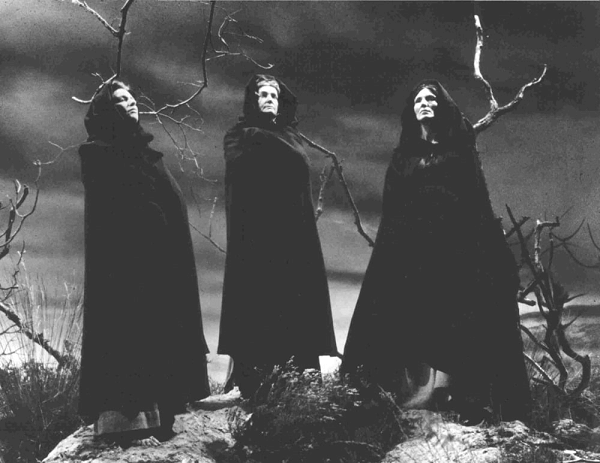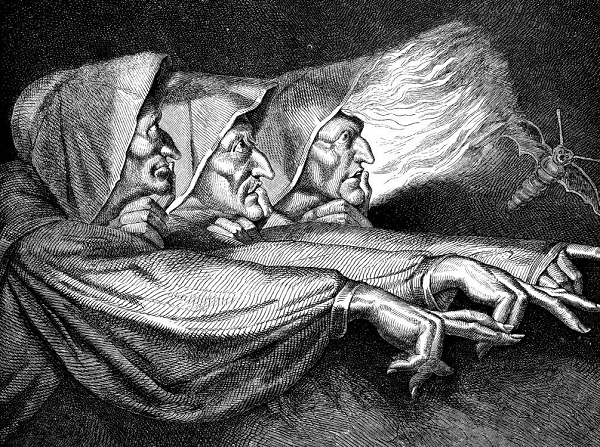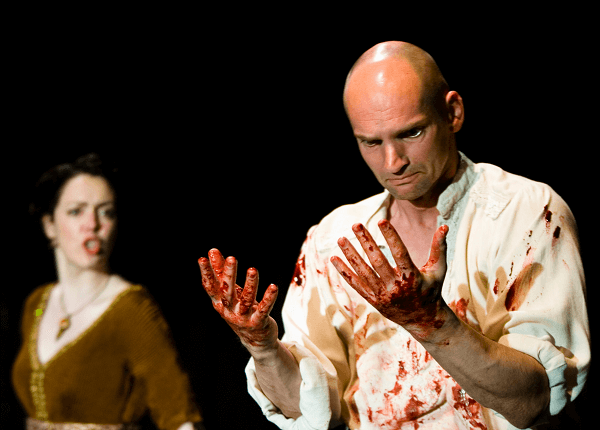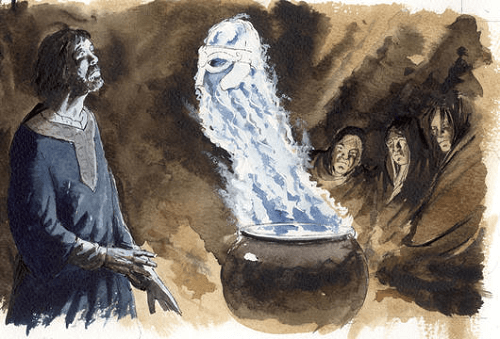Macbeth Summary
About the Author: William Shakespeare
William Shakespeare was born in England's Stratford-upon-Avon in 1564, and he passed away in 1616 at the age of 52. Most people would agree that he is among the finest playwrights in history. Shakespeare composed more than 38 plays as well as over 154 sonnets and poems, many of which are regarded as among the best in English literature. Both the Elizabethan and Jacobean eras saw performances of his plays, and they are still produced and altered today. Shakespeare's works have had a significant impact on literature, theater, and society all across the world. Much of his work showcased universal themes such as love, ambition, jealousy, power, and the human condition.
Macbeth Summary
Shakespeare's tragedy "Macbeth" examines the corrupting effects of guilt, ambition, and power. It tells the tale of Macbeth, a Scottish commander who is foretold to become king by three witches in a prophecy. Macbeth kills King Duncan and ascends to the throne, propelled by his ambition and assisted by his wife, Lady Macbeth, but his guilt and paranoia ultimately bring him down. The play, which is regarded as one of Shakespeare's best, explores morality, fate, and free will.
Act 1

- Scene 1:
The play opens with thunder and lightning, setting the mood for supernatural events. The three witches, often called the "weird sisters", appear on stage and discuss their plans to meet Macbeth. They are accompanied by thunder and lightning, which adds to the eerie atmosphere. The witches then vanish, and the scene ends with the entrance of King Duncan, who is informed that the battle against the Norwegians has been won.
- Scene 2:
In this scene, we are introduced to Macbeth and his friend Banquo. They return from the battle against the Norwegians and encounter the three witches. The witches then greet Macbeth as Thane of Glamis (his current title) and prophesy that he will become Thane of Cawdor (a title he has not yet received) and the future King of Scotland. Furthermore, Banquo is told that he will not become king but that his descendants will. The witches disappear, leaving Macbeth and Banquo wondering if they have just experienced a supernatural encounter.
- Scene 3:
In this scene, we learn that the current Thane of Cawdor has been executed for treason, and King Duncan has given the title to Macbeth as a reward for his bravery in battle. Macbeth receives the news from Ross and Angus, two nobles sent by the king to deliver the news. This news causes Macbeth to contemplate the witches' prophecy, and he begins to think about the possibility of becoming king.
- Scene 4:
In this scene, we are introduced to Lady Macbeth, Macbeth's wife. She receives a letter from her husband informing her of the prophecy made by witches and his new title. Lady Macbeth is immediately filled with ambition and begins to plot how they can make the prophecy come true. When Macbeth arrives, Lady Macbeth convinces him to kill King Duncan to fulfill the prophecy. Macbeth is initially hesitant, but Lady Macbeth successfully persuades him by questioning his manhood.
- Scene 5:
In this scene, Lady Macbeth is alone, reading a letter from her husband. She reveals her ambition and desires to become queen. She also calls on evil spirits to give her the strength to commit murder and remove femininity from her body.
- Scene 6:
King Duncan arrives at Macbeth's castle and is greeted by Lady Macbeth. She welcomes him warmly and leads him to his chambers, where he will spend the night. Macbeth arrives and continues to contemplate the murder of the king.
- Scene 7:
In this scene, Macbeth decides not to go through with the murder. He tells Lady Macbeth he cannot kill the king because he is his host and relative. Lady Macbeth becomes angry and questions his love for her. She then takes matters into her own hands and plans to drug the guards and frame them for the murder.
Overall, in Act 1 of Macbeth, the audience is introduced to the witches, who prophesy Macbeth's future, and Lady Macbeth, who will stop at nothing to ensure the prophecy comes true. Macbeth is initially hesitant to commit murder, but Lady Macbeth can persuade him to go through with it. The stage is set for a tragic end, and the audience is left wondering how the events will unfold.
Act 2

Act 2 of William Shakespeare's play "Macbeth" is a rather grim and disturbing phase in the plot, as it portrays the aftermath and consequences filled with guilt after the king's death. The act is divided into four scenes, depicting Macbeth's descent into madness and his growing paranoia after the murder.
- Scene 1:
Scene 1 occurs in the courtyard of Macbeth's castle, where Banquo and his son Fleance prepare to go to bed. Macbeth enters and speaks with Banquo regarding his strange dreams. Macbeth pretends not to be interested but hints that he wants to speak with Banquo further.
As Banquo and Fleance depart, Macbeth has a monologue in which he reveals his inner turmoil. He is consumed with guilt over killing Duncan and is plagued by hallucinations and voices. He also fears that Banquo and his son may threaten his reign and resolves to have them killed.
- Scene 2:
Lady Macbeth talks about her courage. Because King Duncan resembled her father while sleeping, she was unable to murder him. After killing the king, Macbeth appears, and the two give one other assurance. Later, they collectively decide to pose as observers.
- Scene 3:
Later, everyone reaches the king's chambers in Macbeth's castle, where Macbeth brings Macduff and Lennox with him. Macduff then turns around and screams in fear. As everyone arrives at the scene, Lennox deduces from the clear evidence that the king's chambermaids are the ones who committed the murders. Duncan's sons, Donalbane and Malcolm, decide to move to England and Ireland.
- Scene 4:
Ross and an old man reflect on the nature of the wicked deeds that occurred in the days before outside Macbeth's castle. They are informed of Macbeth's accession to the throne by Macduff. They also suspect both princes because they left the scene.
Overall, Act 2 of "Macbeth" is the initial phase of the main climax of the story, which leaves the readers in a state of blow. It introduces several key themes, such as guilt, paranoia, and madness, which will continue to shape the characters' motivations and actions. It also marks a significant shift in Macbeth's character, as he becomes increasingly ruthless and paranoid, leading to his eventual downfall.
Act 3

Act 3 of Macbeth by William Shakespeare is a pivotal point in the play, as the events that unfold in this act set the stage for the rest of the story. This act comprises six scenes, each contributing significantly to the plot and character development.
- Scene 1:
In the first scene of Act 3, Banquo expresses his suspicions about Macbeth's rise to power and the prophecies made by witches. He also reveals that he dreams of them and feels uneasy about their intentions. Macbeth, who has now become king, enters the scene with Lady Macbeth and asks Banquo to attend a banquet he has arranged.
- Scene 2:
The second scene occurs at the palace, where Macbeth welcomes the guests to the banquet. He sits down to eat but is disturbed by the absence of Banquo, who he believes suspects him of foul play. Macbeth then sees Banquo's ghost, which only he can see, and he becomes increasingly agitated and unhinged. Lady Macbeth tries to calm him down, but the other guests begin to notice his erratic behavior.
- Scene 3:
In the third scene, Macbeth visits the witches to learn more about his fate. They summon apparitions that prophesize his downfall and warn him to be wary of Macduff. Macbeth is then informed that Banquo's descendants will eventually rule Scotland, further fueling his paranoia.
- Scene 4:
The fourth scene takes place outside the palace, where a group of murderers hired by Macbeth to kill Banquo and his son Fleance are waiting. Banquo is killed, but Fleance manages to escape.
- Scene 5:
The fifth scene continues the banquet, where Macbeth's behavior becomes increasingly erratic. He sees Banquo's ghost again and reveals his guilt in front of the guests. Lady Macbeth tries to cover up for him and dismisses the guests while Macbeth is left alone with his thoughts.
- Scene 6:
The final scene of Act 3 takes place in England, where Macduff has gone to seek help from King Edward. He learns that Macbeth has murdered his family and vows to seek revenge. Malcolm, King Edward's son, then tests Macduff's loyalty and finally reveals his plan to take the throne of Scotland with Macduff's help.
Overall, Act 3 of Macbeth portrays Macbeth's paranoia and guilt becoming increasingly pronounced, and his actions become more desperate as he tries to cling to his power. Banquo's murder and the escape of his son, Fleance, sets the stage for further conflict, while Macduff's discovery of his family's murder deepens his resolve to take revenge on Macbeth. The witches' prophecies continue to guide the plot, and the introduction of Malcolm and his plan to take the throne further complicates the political landscape of the play.
Act 4

- Scene 1:
The first scene occurs in a dark cave, where the three witches gather around a cauldron, chanting and preparing a concoction. Macbeth enters the cave and demands to know his fate, to which the witches show him a series of apparitions. The first apparition is an armed head, which warns Macbeth to beware of Macduff. The second is a bloody child who tells him that no one born of a woman can harm him. The third is a crowned child holding a tree, which assures him that he will only be defeated when Birnam Wood moves toward Dunsinane.
- Scene 2:
The second scene occurs in England, where Macduff and Malcolm, King Duncan's son, discuss their plan to overthrow Macbeth. Malcolm again tests Macduff's loyalty by pretending to be an unworthy and immoral ruler, but Macduff is not fooled and expresses his desire to see Malcolm take the throne.
- Scene 3:
Lennox goes out on a walk in the evening in Scotland with another lord, talking about what has happened to the kingdom. Officially, Fleance has been charged with killing Banquo; however, Fleance has left. However, both men believe Macbeth, whom they refer to as a "tyrant", is responsible for the deaths of Duncan and Banquo. The discovery of these schemes has caused Macbeth to get ready for battle. Lennox and the lord express their optimism that Malcolm and Macduff will prevail and their deeds will prevent Macbeth from destroying Scotland.
Overall, Act 4 of Macbeth marks the moment when Macbeth becomes truly trapped in his ambition and delusions of grandeur. The play's supernatural elements are emphasized in the appearance of the witches and the apparitions, which heighten Macbeth's paranoia and desperation. The scene also sets up the final confrontation between Macduff and Macbeth, highlighting the themes of justice, loyalty, and the consequences of unchecked ambition.
Act 5
- Scene 1:
In the first scene of Act 5, Lady Macbeth is sleepwalking and trying to wash her hands of the guilt she feels over her involvement in King Duncan's murder. Her actions are observed by the Doctor and the Gentlewoman, who are worried about her mental state. Lady Macbeth talks about the blood on her hands and confesses to her role in the murders of Duncan and Banquo. The scene ends with the Doctor and Gentlewoman agreeing to keep what they have witnessed a secret.
- Scene 2:
In the second scene, Macbeth prepares for battle against Malcolm's army with the help of his servant Seyton. Macbeth is confident that he will defeat Malcolm's forces, even though he knows the odds are against him. He gives a speech in which he reflects on the futility of life and how it is full of sound and fury, signifying nothing.
- Scene 3:
In the third scene, Malcolm's army approaches Macbeth's castle. The English general Siward orders his son to lead the first attack against Macbeth's forces. The battle begins, and both sides fight fiercely.
- Scene 4:
In the fourth scene, Macbeth kills Young Siward in battle. Despite his victory, Macbeth is beginning to feel the weight of his crimes, and he reflects on the fact that he has lost all sense of purpose and meaning in his life.
- Scene 5:
In the fifth scene, Macbeth encounters Macduff on the battlefield. Macbeth taunts Macduff, believing he is invincible and that no man born of a woman can harm him. However, Macduff reveals that he was born through a Caesarean section and thus not technically "born of woman". The two engage in a fierce fight, and Macduff eventually kills Macbeth.
- Scene 6:
In the sixth scene, Malcolm is crowned King of Scotland. He invited all those who were loyal to him to come to his coronation and promised to reward them for their service.
- Scene 7:
In the seventh scene, Macduff enters the castle and discovers the dead body of King Duncan. He then encounters Lady Macbeth, who has taken her own life in guilt and despair. Macduff informs Malcolm of Macbeth's death and Lady Macbeth's suicide.
- Scene 8:
In the eighth scene, Malcolm rewards his loyal supporters and promises to bring peace and prosperity to Scotland.
- Scene 9:
In the play's final scene, Malcolm reflects on the events that have transpired and praises those who fought against Macbeth. He invites everyone to his feast, saying they can enjoy the fruits of their labor in peace and prosperity. The play ends with Malcolm leading the way to his feast and suggesting that a just and honorable king will now rule Scotland.
Overall, Act 5 of Macbeth is a tragic and dramatic conclusion to the play. The scenes highlight the downfall of Macbeth, as his guilt and paranoia lead him to make fatal mistakes, ultimately leading to his demise. Lady Macbeth's sleepwalking scene also reveals the extent of her guilt and inner turmoil, ultimately leading to her suicide. It is filled with dramatic and tragic scenes that illustrate the consequences of unchecked ambition and the pursuit of power at any cost.
|




 For Videos Join Our Youtube Channel: Join Now
For Videos Join Our Youtube Channel: Join Now









